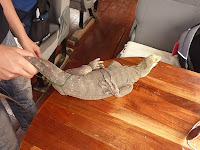Laos is the least developed of the countries in Indochina, but has a history much like Vietnam and Cambodia, albeit without the horrors of Pol Pot. Previously known as "The Kingdom of a Thousand Elephants", it was a subject kingdom of Siam (now Thailand) until it was occupied by the French in 1893 and then by the Japanese, during the Second World War. After Hiroshima, the Japanese left and the French returned, only to find themselves facing yet another fight for independence, this finally being achieved in 1954. Laos was still a kingdom, but in 1975 the communist Pathet Lao took over and have been running the country ever since.
During the Vietnam War, the Americans bombed Laos extensively (and secretly), trying to prevent weapons and supplies from reaching Vietnam down the Ho Chi Minh Trail. In fact, in terms of the tonnage of bombs dropped per head of population, Laos was the most heavily bombed of the Indochina countries, with over one ton of munitions being dropped per person. Much of this never exploded, causing a problem that continues in some parts to the present day.
Laos boasts forty-nine ethnic groups in a population that has more than doubled since WW2 to its current level of 6.7m. Some two thirds of the population is Buddhist, although many are animists as well. The government apparently allows complete freedom of religion and freedom to do whatever else you want, provided, so we were told, that you do what the government says (work that one out!). In fact, the country does not have a particularly oppressive feel to it and the people seem to be pretty contented, although not enjoying a high standard of living. The standard of living is actually one of the lowest in the world, the average annual salary being under $1,000.
There are, however, some pretty repressive laws, for example:
• There is a curfew at 12 midnight.
• It is illegal to have sex with anyone unless you are married to that person.
• Anti-drugs legislation is very strict and possession of even a very small quantity of any illegal drug may result in the death penalty.
• It is illegal for a foreigner to ride a motor cycle.

The scenery in the Mekong valley is pretty impressive, although unfortunately visibility wasn't good because, at this time of year, farmers burn off all the old crops, resulting in a low-level of smoke enveloping the whole country. Nevertheless, the boat trip was very relaxing and gave plenty of time for reading and such things as playing cards. In fact, I learnt another new game, this one rather good (see separate blog).
We saw a number of local activities along the river including fishing, both with nets and with bamboo rods, panning for gold and farming, including rearing pigs and chicken and growing rice and bananas.
At one point, we stopped to visit a small village that lived up on the hills on the side of the river. The people there had nothing to sell and were obviously pretty poor. Some of the children did go to school and one of the boys, who looked about sixteen, but was actually twenty-two, did speak a little English. He was an orphan and still went to school, even at twenty-two. It wasn't clear what he was doing at that age, but I presume it was some sort of primary school. Personally, I didn't feel comfortable gawking at the villagers who, mostly, just stood around, looking, I thought, rather embarrassed. The kids, however, seemed to like it, especially when they were shown photographs of themselves.

We ate lunch on board the boat each day and enjoyed the food prepared by the boatman's wife (the whole family live on tbe boat and just ferry people up and down the Mekong). Whilst we were on board, she bought from the riverside, a live iguana and a rice paddy chicken, the local name for a kind of rat that lives in the rice fields. Fortunately, these were both for the family's own use and not for us. She also bought a large fish (a catfish, I think), that the fisherman had caught in the Mekong and been keeping alive on a line in the water.
All in all it was a well-spent couple of days, for me particularly, as it allowed me to unwind after the heavy schedule of the last three weeks. It also gave us all time to get to know each other and, I'm glad to say, we are an interesting bunch of people, who seem to get on well. There are two Australian couples and four separate ladies, two American, one Canadian and one Brazilian. Then there's me, the sole Englishman. Our tour leader is a delightful and very helpful young Australian girl (in picture).



No comments:
Post a Comment